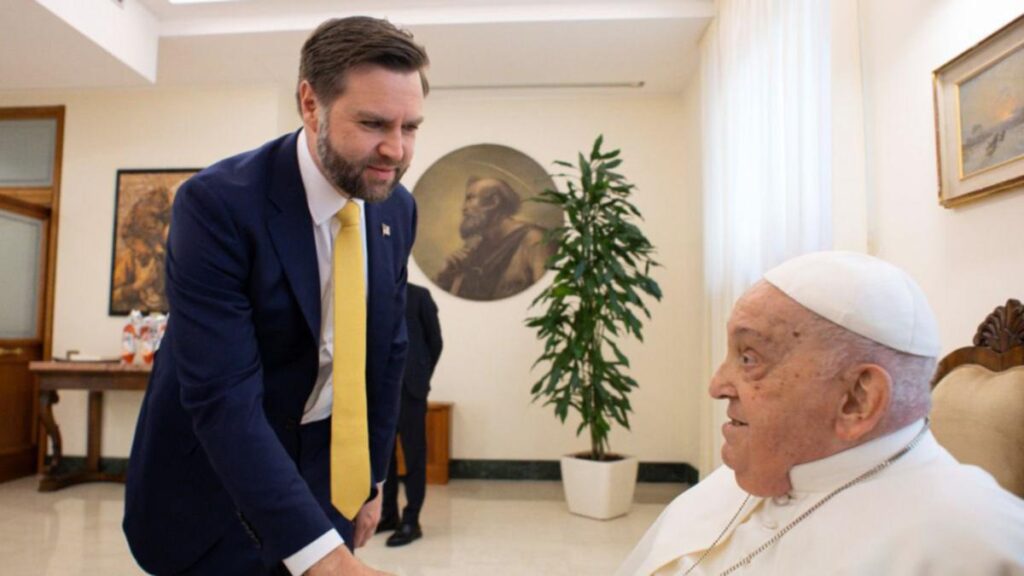VATICAN CITY – On JD Vance’s final morning in Rome, the headlines that the pope had snubbed him were already a day old. Donald Trump’s vice president had come on the busiest weekend of the church’s Jubilee year, expecting a meeting with a sickly pope who had already condemned his policies. Of course the head of the church hadn’t granted it, his critics gloated.
Then, on Easter morning, the streets of Rome shut down.
A motorcade whizzed by with a Vatican flag billowing opposite the Stars and Stripes on Mr Vance’s Chevrolet Suburban. The vice president had been called for an audience with Pope Francis.
Mr Vance and Francis have publicly disagreed in recent months on immigration policies and other aspects of church teaching, so an Easter Sunday meeting with the pope was notable. But for Mr Vance, a 40-year-old Catholic convert, to become one of the few individuals to meet Francis on the last full day of his life, when the pope was visibly lacking strength to speak or express emotion, was historic.
“Hello, so good to see you,” Mr Vance said as he approached Francis in his wheelchair. The pope was about to speak a few words to a crowd of tens of thousands in St. Peter’s Square before an archbishop read Francis’s final Easter homily.
The message decried “how much contempt is stirred up at times towards the vulnerable, the marginalised and migrants.” The address also warned against elected officials who “yield to the logic of fear, which only leads to isolation from others.”
Mr Vance, in the days leading up to the visit, had vehemently defended the Trump administration’s aggressive deportation agenda, slamming both the “illegal migrant invasion” under President Joe Biden and the “smug, self-assured bullshit” coming from critics of Trump’s deportation policies.
The vice president has relished the role of attack dog in an administration that prizes dominance and retribution.
Yet in a plain and starkly lit room in Casa Santa Marta, the pope’s residence within the Vatican, the two men offered only kindness to each other. Mr Vance had sprinted to the pope’s home for a meeting that lasted mere minutes.
And he did most of the talking, offering a show of deference not commonly seen since he joined Trump’s ticket and got an office in his White House.
“I know you’ve not been feeling great, but it’s good to see you in better health,” Mr Vance said.
A representative for the pope presented Mr Vance with a tray of keepsakes from Francis for his family. Francis’s interpreter smiled at Mr Vance throughout, as the pope sought to widen his eyes and nod.
He briefly spoke a few words to welcome Trump’s young vice president, who had converted to the faith just six years earlier.
“Thank you very much for your visit,” a feeble Francis whispered as his interpreter conveyed the message.
“Of course. Of course,” Mr Vance replied. “And thank you for seeing me.”
Moments later, it was over.
The ailing pope’s decision to welcome the vice president seemed to highlight Francis’s sense of duty and care for others – a trait Mr Vance himself had praised just weeks earlier.
“That is how I will always remember the Holy Father: as a great pastor, as a man who can speak the truth of the faith in a very profound way at a moment of great crisis,” Mr Vance said at the National Catholic Prayer Breakfast in late February after Francis had written a public letter that, without naming Mr Vance, clearly condemned his interpretation of Christian teaching about caring for strangers.
Mr Vance also acknowledged that day that Francis had “criticised” the administration’s immigration policies. But he pivoted to make a generous observation: The pope is “fundamentally a person who cares about the flock of Christians under his leadership.”
Mr Vance cited a homily Francis gave to an empty St. Peter’s Square in the early days of the coronavirus pandemic in March 2020. Vance’s wife, Usha, had just had their second baby weeks earlier, and the world was seemingly shut down.
He had bought 900 rounds of ammunition from Dick’s Sporting Goods and two bags of rice from Walmart, Mr Vance told those at the prayer breakfast, unsure of how anything would pan out. Francis’s words were so meaningful during that time of uncertainty, Mr Vance said, that he has repeatedly reread the sermon since.
After the pope’s death Monday, Mr Vance mentioned the sermon again, this time in an X post reacting to the news.
“It was really quite beautiful,” Mr Vance wrote, sharing a link to the Vatican transcript of that sermon. “May God rest his soul.”
© 2025 , The Washington Post



